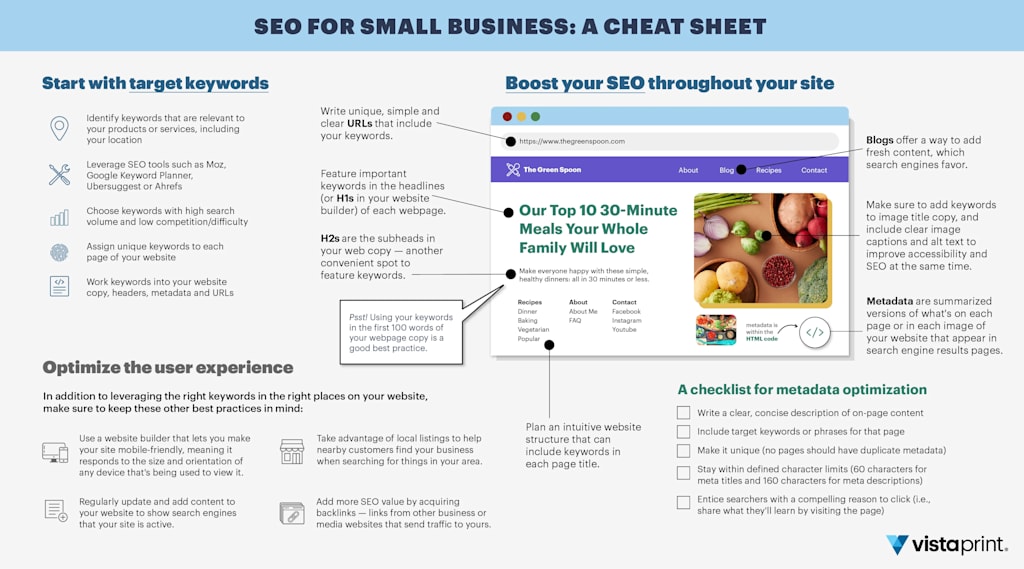Search engine optimisation (SEO) is an important tool for small businesses in Canada looking to boost their online presence. With more Canadians searching for products and services online, understanding SEO in Canada helps your website attract new customers and drive business growth. Mastering SEO strategies for Canada will help your business rank higher in local search results, so you can stay competitive in a digital marketplace.
Local SEO is especially important in Canada, where search behaviour varies by region, language and industry. By focusing on Canadian-specific strategies, businesses can improve their search visibility and reach the right audience. In this guide, we’ll share actionable steps to help small business owners navigate SEO in Canada and make meaningful improvements to their website rankings.
- Use localized SEO strategies to target Canadian-specific keywords and adapt your content to local search trends. Using regionally relevant terms will improve your search rankings and attract more local customers.
- Prioritize Canadian spelling and bilingual content so your website reflects proper Canadian English and French where possible. This improves audience trust, boosts engagement and makes your content more accessible to a wider audience.
- Use your Google Business Profile, backlinks from Canadian domains and a .ca domain name to improve visibility in Canadian search results and drive more targeted traffic.
- Quality, relevance and keyword integration are key to SEO success and will help your website rank higher in search results. Well-structured content with natural keyword placement will improve the user experience and search engine performance.
- SEO is a long-term investment that needs consistency, quality content and ongoing optimisations if you want to achieve sustainable results. Regular updates and monitoring will help improve your search rankings over time.

Source: An SEO optimised website by Nerdville via 99designs by Vista
What is SEO and why does it matter for small businesses in Canada?
SEO is the practice of improving your website’s visibility in search engines like Google. By honing your content for relevant keywords and boosting your site performance, small businesses can attract more organic traffic and increase their customer base.
For Canadian small businesses, SEO is essential for competing in the local market since consumer search habits in Canada can vary by region. Google prioritises business websites that use:
- localised keywords
- location-based content
- region-specific strategies
Understanding these nuances can give your business a competitive edge.
Learn more about digital marketing at VistaPrint’s digital marketing hub.
Understanding Canadian SEO
SEO marketing in Canada differs from other markets because Canadian users often prioritise local businesses in search results, and Google favours websites with .ca domains and Canadian-based backlinks.
Using Canadian English is important. For example, spellings like “favourite” instead of “favorite” and “optimise” instead of “optimise” should be used to match the way local people type their searches. Businesses should also consider bilingual content to reach both English and French-speaking customers in Québec and beyond.
The cost of SEO in Canada varies depending on the approach:
- DIY strategies are free but time-consuming, and most small business owners won’t understand the fast-evolving nature of SEO best-practices.
- Professional SEO services range from $500 to $5,000 per month which can seem daunting for smaller brands.
But investing in the expertise of SEO professionals can lead to long-term gains by improving organic traffic and reducing your reliance on paid ads.

Source: An SEO-optimised website by Tori Cox via 99designs by Vista
Keyword research for Canadian businesses
Behind any successful SEO strategy is keyword research. To rank well in Canadian search results, businesses should use location-based keywords such as “marketing Canada” and “marketing Toronto.”
Location-based terms help search engines understand where your business is the most relevant, and will increase visibility among Canadian audiences. Using secondary keywords such as “SEO marketing Canada” and “digital marketing Canada” will broaden your coverage and strengthen the relevance of your content.
Businesses should also consider using industry-specific keywords that reflect their services and the needs of their target customer. To find the most effective keywords, use tools like Google Keyword Planner, Ahrefs and SEMrush to provide valuable insights into search volume and competition. Conducting competitor analysis can also highlight which keywords are driving traffic to similar businesses in Canada.
On-page SEO: Optimising your website for Canadian audiences
Content optimisation plays a major role in SEO. Writing content that resonates with Canadian consumers and includes local references is a great way to increase your relevance in search engines. Businesses should naturally integrate primary and secondary keywords into the following to boost search rankings:
- headers
- meta descriptions
- body text
Meta descriptions and title tags in particular need to be engaging, informative and keyword-rich. Search engines use these to understand page content, and title tags are an important element of ranking success.
Meta descriptions, on the other hand, are an influencing factor for your click-through-rate. They need to be informative and include keywords to attract users attention and, in turn, clicks. Including Canadian terms and location-specific phrases is another way to boost your relevance in search results.
Internal linking is also an important factor in on-page SEO. Businesses should aim to create a network of links between their content to improve navigation and engagement. This practice also helps search engines understand site structure and enhances user experience.
Visit VistaPrint’s Hub to learn more about developing local SEO strategies.

A cheatsheet to help you understand SEO in Canada
Off-page SEO and building credibility with Canadian links
Backlinks from trusted Canadian websites help establish your domain authority and improve search rankings. Search engines view backlinks as a sign of credibility, making them an important component of off-page SEO.
To build high-quality backlinks, look for guest blogging opportunities, collaborate with Canadian influencers and list your business in high-quality, selected and trusted local directories such as Google Business Profile, Apple Maps, Facebook, Yelp, Foursquare, Yellowpages and similar authoritative sites.
Using a .ca domain also strengthens a business’s Canadian identity. Search engines prioritise .ca domains for Canadian searches, which increases visibility among local audiences. Many Canadian businesses have reported improved rankings after making the change to a .ca domain, so it’s a worthwhile investment for companies specifically targeting Canadian consumers.
Local SEO and getting found in your city or province
Google Business Profile (GBP) is one of the most powerful tools for local SEO. Businesses should claim and optimise their GBP listing by adding up to date business details, images and operating hours. Encouraging customer reviews and responding to feedback also improves rankings and builds your credibility.
Local citations and directories play a key role in strengthening local SEO efforts. Listing a business on Canadian platforms like Yelp Canada, 411.ca and Yellow Pages will reinforce your relevance as a local business.
Tune up your technical SEO
A fast and mobile-friendly website is key for user experience and search rankings. Google prioritises websites that load quickly and perform well across different devices. Tools like PageSpeed Insights and GTmetrix can help you diagnose and fix performance issues to speed up your site.
Implementing local business schema helps highlight important details such as:
- business location
- hours of operation
- customer ratings
Schema markup provides search engines with structured data about a business, improving visibility in local search results. Image SEO is also essential, and businesses should use Canadian-themed images where possible, while optimising alt text with relevant keywords.

Source: A graphic for an SEO business by ConceptAlley via 99designs by Vista
Measuring success
Tracking SEO performance allows businesses to refine their strategy and improve their results over time. Key metrics to monitor include:
- organic traffic
- bounce rate
- keyword rankings
Tools like Google Search Console, Google Analytics and SEMrush can provide in-depth analytics to help you measure progress. Using this information you can make data-driven adjustments to improve your long-term SEO success.
Common SEO mistakes to avoid
Many businesses struggle with some SEO no-nos like keyword stuffing, poor internal linking and slow page speeds. Ignoring mobile optimisation and failing to make the most of local SEO tactics can significantly hinder your search rankings. Avoiding these simple mistakes will improve user experience and your search visibility as a result.
Keyword stuffing
Keyword stuffing is when a webpage is overloaded with the same keywords in an unnatural way as an attempt to manipulate search rankings. This can make content difficult to read and negatively impacts the user experience.
Instead of forcing keywords into every sentence, focus on integrating them naturally by using variations of your target terms and placing them within headers, subheadings and throughout well-written content. Google’s algorithms are able to recognise relevance without the need for excessive repetition. Using synonyms and related terms can also help improve readability while still optimising for search engines.
Poor internal linking
Internal linking is the practice of linking to other relevant pages within your website. Poor internal linking can cause navigation issues, making it harder for users and search engines to find important pages.
To avoid this mistake, create a clear linking structure that guides visitors to valuable content while keeping search engines informed about page hierarchy. Use descriptive anchor text like “Learn top SEO tips” rather than generic terms like “click here,” and make sure your links are relevant to help establish your authority on a topic. Regularly audit your site to remove broken links and update outdated ones to maintain a good user experience.

Source: Avoid SEO mistakes when writing and optimising your website content. Image via Depositphotos
Slow page speeds
A slow-loading website can drive users away and hurt your search rankings. Google considers page speed as a ranking factor because it directly affects the user experience. Common causes of slow page speed include large image files, excessive plugins, unoptimised code and poor server performance.
To improve loading times, compress images, enable browser caching and minimise JavaScript and CSS files. Use a content delivery network (CDN) and upgrade to a faster hosting provider to also improve page-loading performance. Regularly test your site speed with tools like Google PageSpeed Insights or GTmetrix and implement any suggested improvements.
Mobile optimisation issues
With the majority of online searches happening on mobile devices, having a mobile-friendly website is essential. A site that isn’t optimised for mobile can appear distorted, be hard to navigate and load slowly, leading to higher bounce rates.
To avoid this mistake, use responsive design so your website adapts to different screen sizes. Prioritise fast-loading mobile pages by reducing unnecessary elements and enabling AMP (Accelerated Mobile Pages) where applicable. Test your website on different devices and use Google’s Mobile-Friendly Test to identify and fix any usability issues.
Optimise your website with SEO
SEO is an ongoing process that calls for consistency and adaptation. By applying these strategies, you can improve the online visibility of your business in the Canadian market. High-quality content, strong backlinks and technical optimisation all contribute to sustainable growth.
FAQ: Top SEO questions answered
What is SEO in Canada?
SEO in Canada involves optimising websites to rank higher on search engines like Google. It focuses on local and national search trends and helps businesses attract Canadian audiences by improving visibility through keywords, backlinks and technical optimisations.
How much does SEO cost in Canada?
SEO costs in Canada vary widely, ranging from free DIY efforts to professional services that could cost between CAD 500 to CAD 5,000+ per month. Factors like competition, service quality and business goals will determine the price.
Is paying someone to do SEO worth it?
Hiring an SEO expert or agency can save time and deliver better results, but DIY SEO is an option for those with less money to invest but more time to learn. The right choice depends on your budget, goals and the complexity of your website.
How long does it take to see results from SEO?
SEO results typically take 3 to 6 months, but highly competitive markets may take longer. Consistency and high-quality strategies will speed up your SEO improvements.




